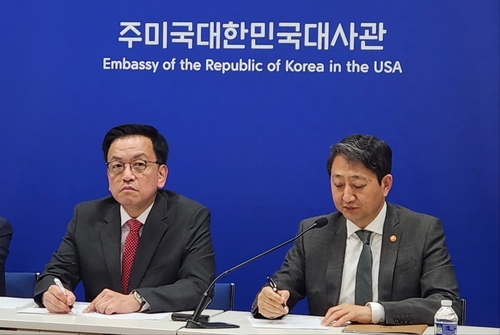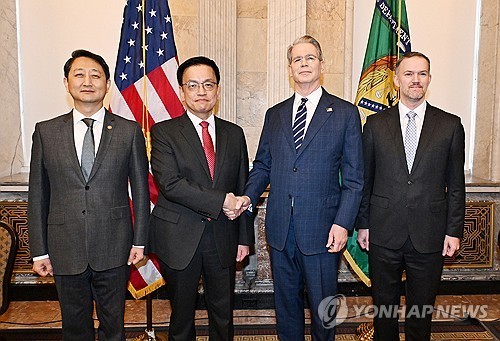- S. Korea unveils first graphic cigarette warnings
- US joins with South Korea, Japan in bid to deter North Korea
- LPGA golfer Chun In-gee finally back in action
- S. Korea won’t be top seed in final World Cup qualification round
- US men’s soccer misses 2nd straight Olympics
- US back on track in qualifying with 4-0 win over Guatemala
- High-intensity workout injuries spawn cottage industry
- CDC expands range of Zika mosquitoes into parts of Northeast
- Who knew? ‘The Walking Dead’ is helping families connect
- California Assembly OKs highest minimum wage in nation
S. Korea, U.S. agree to seek ‘July package’ deal on tariff, other issues
South Korea and the United States concurred Thursday on joint efforts to craft a “package” agreement on new U.S. tariffs, and economic and industrial cooperation issues by early July, Seoul’s finance minister said, as the allies held high-level trade talks in Washington.
Finance Minister Choi Sang-mok told reporters that the two sides agreed to pursue the deal by July 8 — when U.S. President Donald Trump’s 90-day pause on “reciprocal” tariffs ends — through talks focusing on four categories — tariff- and non-tariff measures; economic security; investment cooperation; and currency policies.
Toward that end, Seoul’s industry ministry and the Office of the U.S. Trade Representative (USTR) plan to start working-level talks next week, while USTR Jamieson Greer is set to visit South Korea for high-level talks on the margins of the ministerial Asia-Pacific Economic Cooperation talks slated to kick off on May 15.
These broad agreements came as Choi and Industry Minister Ahn Duk-geun met U.S. Treasury Secretary Scott Bessent and Greer for the “two-plus-two” trade consultations that took place at the Treasury Department for around 85 minutes.
“Our side assesses that the two sides have come to share an understanding that they will craft a ‘July package’ aimed at removing (U.S.) tariffs (on South Korea) by July 8 when the pause on reciprocal tariffs ends,” Choi told Korean reporters at the South Korean Embassy.
This week’s talks set a broad framework on how future bilateral talks on tariffs and other issues should proceed — a departure from earlier discussions that were carried out in a somewhat disorganized manner, according to Seoul officials.
“Our assessment is that through the two-plus-two meeting today, which is a starting point for consultations, we established a basic framework by narrowing the scope of subjects for talks and reaching an understanding vis-a-vis the consultation schedule,” Choi said.
“It is meaningful that the two countries were able to share the view toward conducting calm, orderly consultations without haste.”

The talks came after the Trump administration started imposing country-specific reciprocal tariffs, including 25 percent duties on South Korea, on April 9, only to pause them shortly afterward. Its 25 duties on automobiles went into effect on April 3 with the same-rate levies on some auto parts set to come no later than May 3.
The South Korean delegation requested exemptions of both reciprocal and sectoral tariffs that affect Asia’s fourth-largest economy.
“We explained (South Korea’s) concerns that the imposition of reciprocal and sectoral tariffs could negatively affect bilateral economic cooperation, and we conveyed our position that exemptions and exceptions from tariffs on Korea are needed,” Choi said.
He added that the Korean delegation focused on the negative impact of the tariffs on automobiles during the talks, as the South Korean automotive industry is expected to be hit hard by the new auto tariffs.
On the currency policy front, the two sides agreed to task Seoul’s finance ministry and the U.S. Treasury Department to conduct related consultations.
Choi pointed out that the South Korean delegation called for the U.S.’ understanding on the need to consider various factors during the future talks, including South Korea’s political schedule, domestic trade-related laws and the need to cooperate with its legislature on trade issues.
The request came amid expectations that an envisioned deal between the two countries might come after South Korea holds a presidential election on June 3. The election was set up following the recent ouster of President Yoon Suk Yeol over his short-lived martial law imposition in December.
Earlier in the day, Bessent described trade talks with South Korea as “very successful.”
“We had a very successful bilateral meeting with the Republic of Korea today. We may be moving faster than I thought,” Bessent said during a press availability at the White House, referring to South Korea by its official name.
“We will be talking (about) technical terms as early as next week as we reach that agreement on understanding as soon as next week. So the South Koreans came early. They came with their A game, and we will see if they follow through on that,” he added.
Regarding what Bessent called “A game,” Ahn said that South Korea outlined a detailed vision for bilateral collaboration in the shipbuilding industry, including the U.S.’ capacity building, South Korea’s investment opportunities in the industry and technological cooperation.
Seoul prepared the presentation on the vision as the Trump administration has been striving to rebuild America’s shipbuilding industry, with China known to have over 230 times the shipbuilding capacity of the U.S.
During this week’s talks, the two sides did not discuss defense cost-sharing issues although U.S. President Donald Trump has cast his negotiation approach as “one-stop shopping” — a term that raised the prospects of the tariff meeting going beyond just trade issues.













